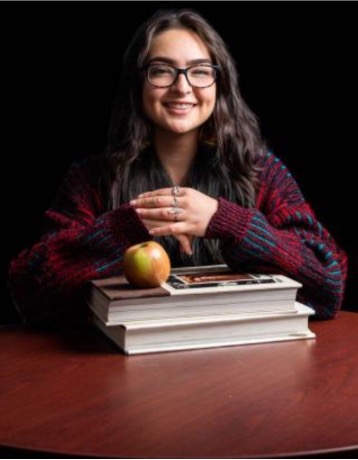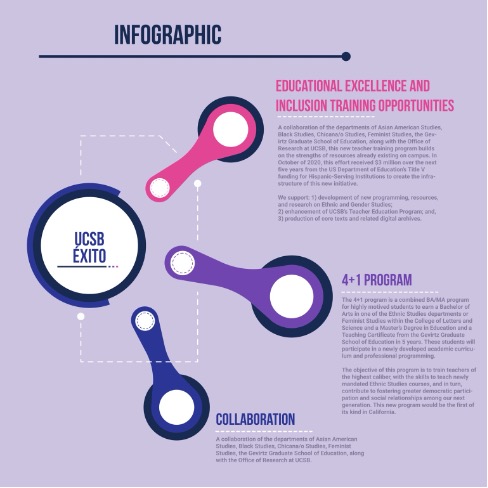News Date:
Content:
Victoria Rivera-Cisneros is a first-generation graduate student at UC Santa Barbara who believes introducing ethnic studies into high schools will provide children with the agency to challenge what they are taught, think critically, and have access to accurate tellings of history, without needing to go to college.
Rivera-Cisneros is currently pursuing a Masters in Education and History as well as Social Science teaching credentials, with an emphasis in Ethnic Studies. As an undergraduate, she was an EXITO (Educational Excellence and Inclusion Training Opportunities) Scholar.
EXITO is a new teacher training program that is a collaboration between the departments of Asian American Studies, Black Studies, Chicana/o Studies, Feminist Studies, and the Gevirtz Graduate School of Education, as well as the Office of Research at UCSB.
In October 2021, California became the first state to pass a law requiring the inclusion of ethnic studies in order to graduate high school. Rivera-Cisneros recently discussed the importance of challenging accepted cultural narratives in the educational system.

Victoria Rivera-Cisneros, a first-generation graduate student at UC Santa Barbara. (Image credit: Victoria Rivera-Cisneros)
Q: How does your undergraduate major relate to what you want to teach?
A: I studied Chicane Studies as an undergrad at UCSB for five years, with a minor in Education. The more I learned, the more frustrated I became that this education is not accessible to people outside of college. Not everyone has the opportunity to go to college, and they shouldn't have to wait until college to learn different history, real history, dark truth that people don't want to want to talk about.
Since I want to be an Ethnic Studies teacher, I want to make sure kids are aware of the histories that actually explain why their lives are the way they are and why our country is in the state that it's in, so they can make sense of what's going on around them.
Q: What is your highest priority as you prepare to become an educator?
A: I am dedicated to being a great teacher, because the system needs it. The kids need people that care about them. There is a huge cycle of violence being perpetuated against students, specifically Black, Indigenous students, and other students of color. The education system is so shitty, and I feel better trying to make it less so.
Q: What can you tell me about the UCSB EXITO Program?
A: I was a part of the very first cohort at EXITO in 2021-2022. EXITO prepares individuals to become ethnic studies teachers at the high school level. We focus on doing research throughout the year. You also do hours at a local high school to shadow current ethnic studies teachers.
EXITO also helps during the application process for graduate school with test prep, application workshops, essay workshops, resume workshops.

Q: How did you find yourself getting involved with the EXITO program?
It was during the pandemic, my third year, 2020-2021 when Adanari Zarate had been teaching Chicano 101C: Teaching for Social Justice. She pitched EXITO to the class. I already knew I wanted to be a teacher, and I knew I wanted to teach this kind of history. I just didn't know what was available or how to go about it.
A: When she pitched it, I was like, “Oh my god, this is the perfect pathway, finally some help!” I applied for the program, got in, and just went from there… EXITO was a really nice support system to navigate that process.
Q: What type of a lens can Ethnic Studies give students with which to view the world?
A: A critical lens. It makes you question everything you’re taught. It teaches you not to take things at face value, that you should be able to think on your own and create your own thoughts about whatever’s presented to you. It teaches students to develop their own agency for their education and for their lives in general. It helps them know that they have the power to live their lives the way they want to. It’s just a matter of figuring out how to get there.
Q: What do you find the most rewarding about working with the students?
A: When they succeed. I was placed at an alternative continuation school and I was there for two years. I got to watch these kids grow for two years and see their interest in college peak more and more. I got to see them figure out what they want to do with their lives. Just seeing them succeed, it's a feeling like no other. And I love this feeling.
Leslie Arzate is a fifth-year student at UCSB studying Feminist Studies. She wrote this article for her course Digital Journalism.






